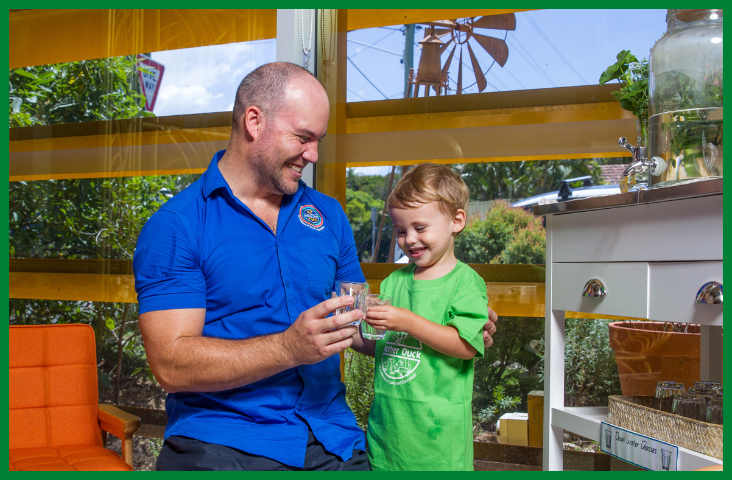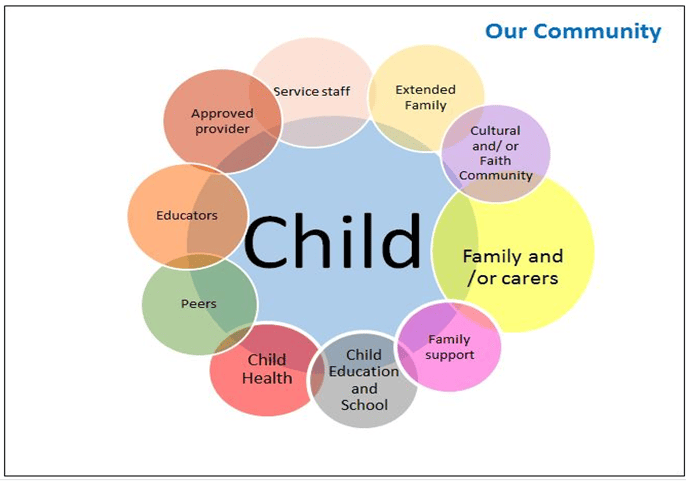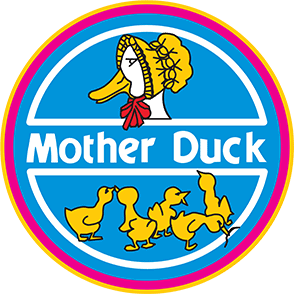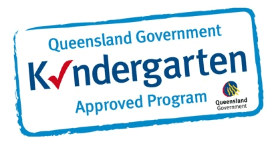
What makes our Mother Duck services such a special community?
Have you heard the proverb ‘It takes a village to raise a child’? By definition it is explained that an entire community of people must provide for and interact positively with a child in order for them to experience and grow in a safe and healthy environment. We at Mother Duck recognise that collaborative relationships with families are fundamental to achieving high quality positive developmental and educational outcomes for children. We believe that when our families and children feel meaningfully connected during their time with us that we become a community with a shared purpose.
Having a positive sense of identity and experiencing respectful, responsive relationships strengthens children’s interests, knowledge, and skills in being and becoming active contributors to their world. As children move into early childhood settings, they broaden their experiences as participants in different relationships and communities. Belonging, Being and Becoming: The Early Years Learning Framework for Australia (EYLF) (V2.0 2022, p. 38)

First and foremost, a child’s relationship environment begins with the family, but then eventually extends to adults and peers outside of the family who have important roles in their life. When you place your child into an early childhood setting, educators and other education and care staff can also become a significant part of many children’s relationship environment.
Working alongside family is community, which is essential to providing an important connection with the environment, encouraging belonging, connecting children with a sense of identity and joining children and families into supportive relationships and resource networks. We know that positive, responsive, consistent and secure relationships with others provide a supportive, growth-promoting environment for children’s development, well-being and learning, which is particularly important during the early years when the foundations of brain architecture are being built. Our children’s academic, social-emotional and mental health outcomes are built on this foundation.

Source: https://www.acecqa.gov.au/latest-news/blog/it-takes-village-raise-child-role-community-part-3
One key priority is to build a positive sense of community for each child where they feel a sense of belonging and support. A service that is strongly connected to the people and place of its community is welcoming, inclusive, and connected to the culture and context of children’s families; this is done so while nurturing respectful and reciprocal relationships. Connection to community creates a responsive, safe and stable education and care environment which, in turn, promotes children’s belonging and learning.
On a service level, there are a number of ways that our Mother Duck services build on partnerships with families and our local neighbourhood districts to create ‘a sense of community’:
- First impressions count – right from first contact with a Mother Duck service you will observe that our manner and approach is intentionally warm and welcoming, and our enrolment and induction process is designed with flexibility in mind so that each individual family and child has the time and space to feel a sense of belonging, safety, and respect.
- Open and transparent communication – At all levels of service delivery our practice supports consistently liaising with families to ensure we communicate the types of information that is most important in formats that best suit everyone’s busy lives. For example, we consistently communicate children’s daily information via hard copy, share key operational practice changes and policy advice in email and regularly unpack our pedagogical approaches and community presence in posts using our website and Facebook social media platform.

- Getting to know our families – Educators work to grow their knowledge of kinship systems and cultural connections in their local communities so they can build engaging reciprocal relationships between early childhood settings and community. On our journey of getting to know each other, you can observe educators actively listening, learning about and showing respect for the background, cultural identity and strengths of each family to inform our educator practices. Additionally, throughout the year we engage our families in both informal and formal discussions and at planned gatherings to understand expectations and to develop shared goals for children’s learning.
- Building trusting partnerships – We know that responsive learning relationships are strengthened as educators and children learn together and share decisions, respect and trust, and so accordingly we plan for strong, collaborative relationships with all our families. We support our families to feel supported and empowered in their parental roles, ensure their voices are heard, and demonstrate respect through establishing trusting and authentic relationships. Trust takes time to build, however, we know that by making our families the priority we can ensure the highest delivery of education and care for each child.

- Connections – We know the importance of ensuring our educator practice is informed by and is responsive to, each of our unique communities and family contexts. Our local community members hold a wealth of knowledge, capacities, expertise, and resources that our services can learn from and build skills in. On a regular basis we connect and work with allied health specialists, pedagogical and industry experts including ACECQA – acecqa.gov.au, and family support professionals and organisations to strengthening the positive educational and developmental outcomes for your child across the community context.
- Research data – We at Mother Duck are constantly researching new and inspiring family and early childhood research data to guide our educator’s practice. One example includes our use of the Australian Early Development Census (AEDC) – aedc.gov.au resource which is population-based data, gathered by the Australian Government that measures how children in Australia have developed by the time they start their first year of full-time school. Our Mother Duck services use the AEDC data to better understand the degree and concentration of developmental vulnerability and the needs of children in their community. The data explorer tool on the AEDC website allows our services to search for detailed information for the specific communities and suburbs where each of our Mother Duck services are located.

In the Mother Duck universe, children and families are the pinnacle of our world. From families’ first impressions, to how we connect with care, build trusting relationships and respond to each individual families’ expectations and needs for support, Mother Duck is committed to recognising families as children’s first and most important social and cultural community, where they learn about who they are, and their place in the world.
The principal gift that children offer us is an understanding of their identity within this community. It is therefore our professional obligation to form strong and authentic alliances with families to ensure that children can move across both settings with a sense of safety and security and that families and educators share a mutual respect for each other’s impact on children’s lives.
The Philosophy, Ethics and Social Responsibility of Mother Duck Child Care and Kindergarten (Philosophy, Ethics & SR Final (V6) July 2022 p. 1)


